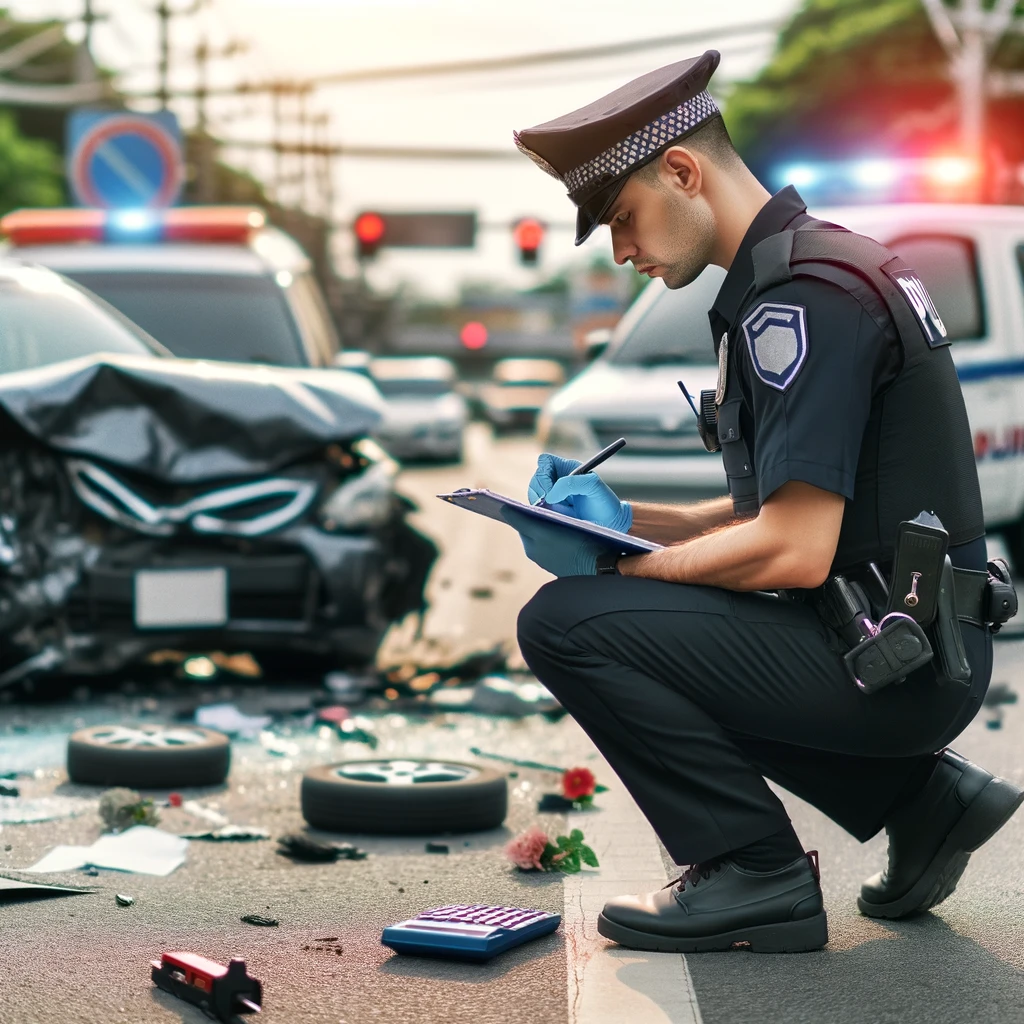How Car Accident Fault is Determined by Police, Insurance, and the Courts
When a car accident occurs, police officers, car insurance companies, and the courts play significant roles in determining fault. The police report is a foundational document that records the details of the accident from the perspective of the responding police officers. It includes observations of vehicle damage, collision scene conditions, and statements from drivers involved and witnesses.
Although a crucial piece of the puzzle, it’s not the end-all in determining fault car accident scenarios. Insurance companies and legal professionals scrutinize the report, alongside physical evidence and traffic laws, to determine fault comprehensively. Fill out a contact form for a FREE case evaluation.
The Process to Determine Fault in a Car Accident
Determining fault after a car accident is a multi-step process that involves examining all the evidence presented. Insurance adjusters and legal representatives look at photos of the accident scene, medical records, and traffic citations, if any, to build a case for or against fault determined. They consider whether drivers involved adhered to the speed limit and exercised reasonable caution. Through a lens of comparative negligence or contributory negligence, as applicable, they evaluate if the actions of any party involved fell below the standard of care expected of a reasonable person.
How Does Insurance Work in an At-Fault State (like Texas)?
Texas operates under a “fault” car insurance system (as opposed to a no-fault state like Florida or New York), which means that the insurance company of the driver at fault is generally responsible for paying for property damage, medical expenses, and other costs stemming from the accident. This can involve negotiations between insurance companies determine fault and the coverage stipulated under the liable party’s insurance policy. Insurance coverage levels and the details of the insurance claim can greatly affect the compensation received by the injured parties. Importantly, Texas uses “modified comparative negligence”, which just means that you can still sue even if you are partially responsible for your injuries.
What if I Don’t Have Car Insurance?
If you’re involved in a car accident in Texas and don’t have a car insurance company, you are in violation of state laws regarding financial responsibility. Without auto insurers, the at fault driver—if that is you—would be held legally responsible for all damages incurred in the collision. This could include paying out of pocket for medical costs, vehicle damage, and potentially being sued for additional compensation, which can have long-lasting financial implications.
How Police Determine Who Is at Fault in a Car Accident
Police officers who respond to the accident scene take immediate steps to gather evidence, which includes taking statements from those involved and any witnesses, inspecting the vehicles involved for damage, and looking for physical evidence such as skid marks or debris. This information is compiled into an accident report.
Although the police report doesn’t ultimately prove fault for the accident, it provides a factual basis that the insurance company and courts can use to make informed decisions about who is at fault. The report may also include a police officer’s opinion on who violated traffic law, which can be influential in fault after a car accident determination.
The Police Report is Important, but Not Infallible
While a police report is an essential element for insurance companies and attorneys in understanding how an accident happened, it’s important to remember that it is not infallible. Human error, subjective observations, and incomplete information can all influence the contents of a report. Police determine fault, but they are human like the rest of us.
Therefore, although the police report can heavily sway the opinion of the insurance company and judges, it is one of many factors considered when determining fault. In some cases, further investigation may reveal discrepancies in the report, which could affect the insurance claims process or the outcome of a legal proceeding. Even if the police officer determines it is a no-fault car accident, that doesn’t mean you won’t be able to recover after an investigation.
Do not ever admit fault after auto accidents. The reason is simple – even as an involved party, you’re not in the best position to determine fault in an accident – and an admission of fault can only hurt you.
Recoverable Damages
Recoverable damages following car accidents can significantly impact the financial stability of the other driver. These damages may include compensation for medical costs, reimbursement for lost wages, and funds for repairing or replacing property damage. The extent of recoverable damages hinges on the degree of fault determined for each party. In no fault states, personal injury protection might cover certain losses regardless of fault, but in at-fault states like Texas, the compensation depends largely on proving who was at fault for the auto accidents based on evidence.
Evidence Involved in Determining Fault of a Car Accident
A comprehensive assessment of all evidence presented is critical when determining fault in a car accident. This includes but is not limited to physical evidence from the accidents such as skid marks and vehicle positioning, medical records that document injuries sustained, witness statements, and any traffic citations given to you or the other driver. Insurance companies and legal bodies look at these pieces of evidence to paint a picture of the accident scene and establish which driver’s fault contributed to the accident. Adherence or violation of traffic law is also a vital component of this assessment.
How the Insurance Company Determines Who Is at Fault After a Car Accident
Insurance companies engage in a meticulous process to determine fault after a car accident. This involves insurance adjusters sifting through police reports, insurance claims, and driver statements, as well as examining evidence presented such as property damage and medical costs. The insurance adjuster may also consider state laws and your own insurance company policy details, such as liability coverage and insurance coverage limits. The goal is to establish which insurance policy will be responsible for covering the damages — a crucial determination in at fault states. With fault determined, your personal injury lawyer can then focus on negotiating damages – the amount of the claim.
How Courts Determine Who Is at Fault in a Car Accident
When an auto accident dispute escalates to a courtroom, the courts determine fault by evaluating all the evidence in a more formalized and legal context. In court, fault in a car accident is ultimately determined by a judge or jury. Doctrines like comparative negligence or contributory negligence may apply, which can apportion fault among drivers involved based on their level of responsibility in causing the accident. The evidence assessed can range from medical expenses to traffic court records, and a judge or jury will be tasked with interpreting this information to arrive at a fair conclusion.
Traffic Citations
Traffic citations issued to one or more drivers can be telling indicators of fault. These citations are proof of traffic law violations, such as running a red light or exceeding the speed limit, and can support the claim that the negligent driver breached their duty of care. Insurance companies and courts often view citations as substantial evidence when determining fault. However, one should note that a citation does not automatically assign fault after a car accident; it is one element of the broader investigation into the accident.
How to Prove You Are Not at Fault in an Accident?
To demonstrate that you are not the at fault driver in a car accident, it’s imperative to compile a robust body of evidence. This can include collecting witness statements, securing video footage from traffic cameras or dashcams, and obtaining a copy of the police report. Y
our car insurance company can assist in this process, but it’s also wise to maintain your own records. Photographs of the accidents, vehicle damage, and traffic citations issued to the other party can also be influential. Documentation of insurance coverage, insurance claims, and any physical evidence that can support your account of the events will be fundamental in insurance companies determine fault. It’s a meticulous process, but necessary to ultimately prove fault lies elsewhere.
Still Have Questions About Who Is at Fault After an Auto Accident?
Navigating the aftermath of an auto accident can be complex, especially when it comes to legal fault determined in a car accident based on limited evidence. If you find yourself uncertain or in disagreement with the fault assessment provided by insurance companies, it’s prudent to seek legal counsel.
A personal injury attorney specializes in interpreting the nuances of accidents, insurance policies, and traffic laws. They can provide clarity on aspects such as comparative negligence among multiple vehicles, liability coverage, and the potential for recovering damages for medical expenses and lost wages.
After a Car Accident, Speak With a Personal Injury Lawyer at ATX Legal
In the wake of a car accident, especially where fault is contested or unclear, consulting with a personal injury lawyer at ATX Legal can be an invaluable step. An experienced attorney can help you navigate the complexities of insurance claims, police reports, and the legalities of fault determined in a car accident. They can advise you on gathering evidence, dealing with insurance adjusters, and if necessary, representing your interests in small claims court or higher courts. An attorney will work to ensure that all relevant evidence presented is considered, helping to protect your rights and advocating for a fair outcome. Fill out a contact form or text 512-677-5003 for a no-cost evaluation.



